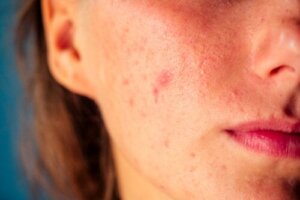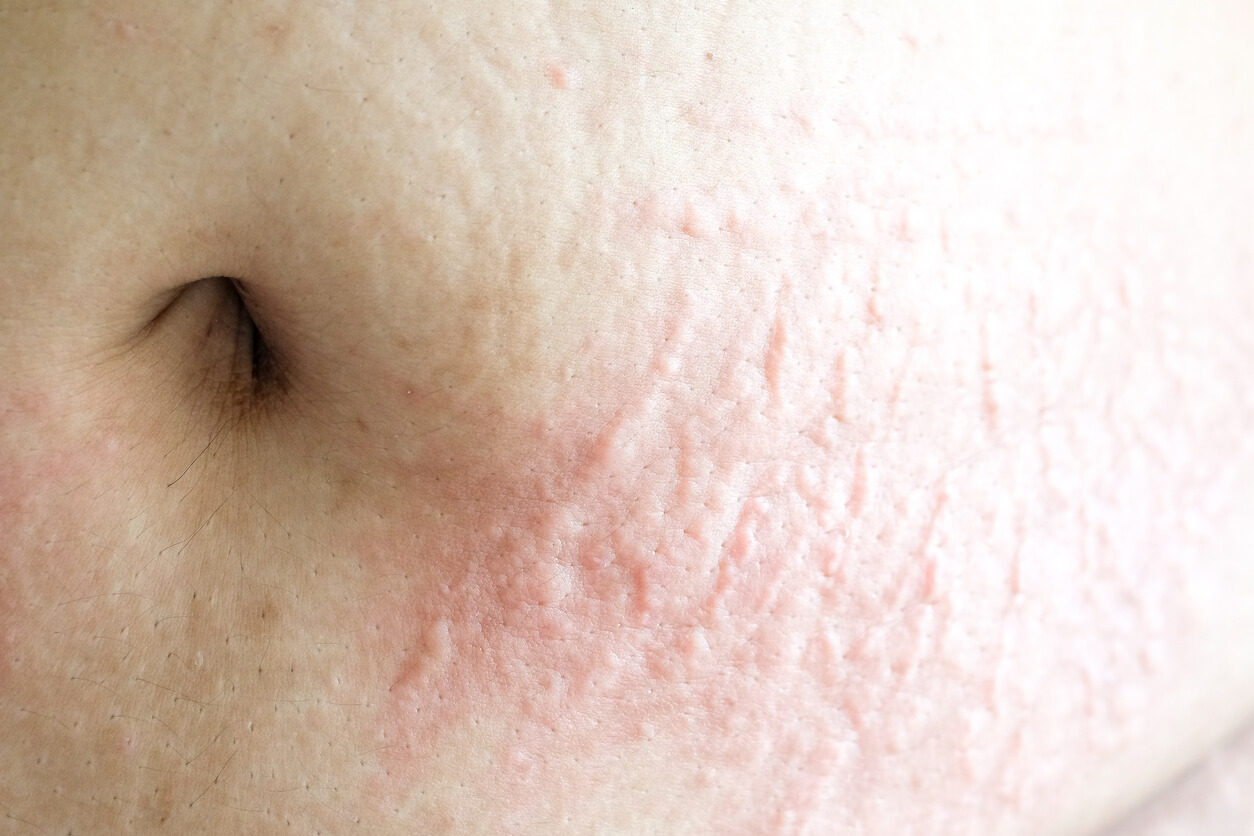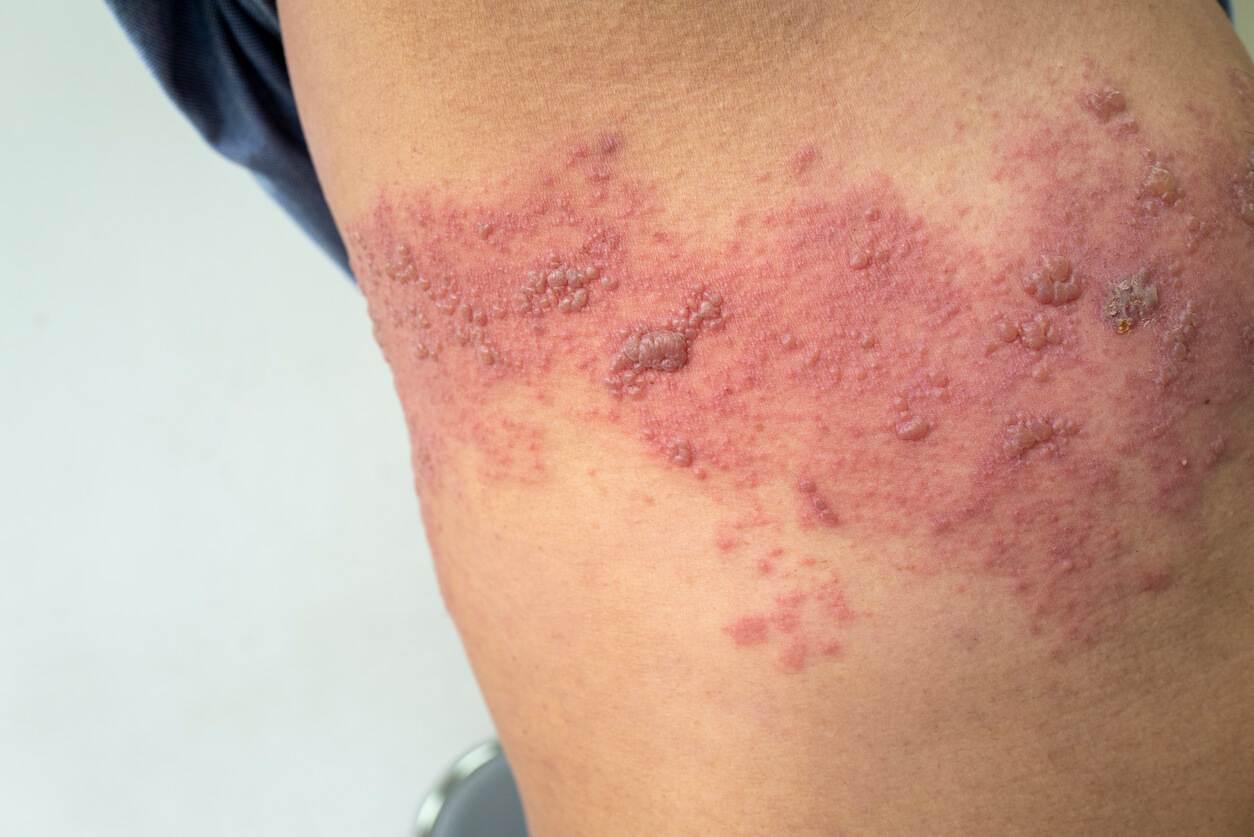Chickenpox and Shingles During Pregnancy


Written and verified by the dermatologist Maria del Carmen Hernandez
Here’s everything you need to know about it.
What are chickenpox and shingles and why do they occur?
Shingles is a viral infection caused by the varicella-zoster virus. Once the initial case of chickenpox has resolved, the virus remains dormant in the body’s nervous system for quite some time and then reactivates as herpes zoster, also called shingles.
Therefore, if you’ve never had chickenpox, you can’t get shingles. On the other hand, if you are exposed to someone who has shingles and you do not have immunity to chickenpox, the person will contract this last disease.
The symptoms of herpes zoster during pregnancy
Most cases of shingles resolve within 3 to 5 weeks. In those who have risk factors, the disease may even occur more than once.
The herpes zoster lesion presents as a cluster of fluid-filled blisters on one hemisphere of the body in a specific area of the skin called a dermatome. This is the difference from the small blisters scattered throughout the body seen in chickenpox.
According to a publication by the American Academy of Dermatology, symptoms include the following:
- Chills
- Fever
- Headache
- Muscle pain
- Fatigue
Read also: Everything You Need to Know About Monkeypox During Pregnancy

How are chickenpox and shingles spread during pregnancy?
Chickenpox is spread by close contact between people. In fact, if no symptoms have ever been expressed before, it can appear at any age. Therefore, the means of contagion are through respiratory droplets or by direct contact with lesions that haven’t yet healed.
If you’re pregnant and have never had chickenpox, it’s best to avoid contact with those who have this disease or shingles. The virus is contagious as long as the lesions are exposed and haven’t evolved into scabs.
Are pregnant women at higher risk of infection?
It’s possible that during pregnancy, cases of shingles tend to increase. This is because a state of natural immunosuppression is generated that lowers the body’s own immune defenses.
If shingles is triggered during pregnancy, it won’t harm the baby. In fact, the immunity that the pregnant woman may have to chickenpox would help to protect the baby before birth. However, if the pregnant woman doesn’t have immunity or isn’t inoculated with the vaccine, exposure to the virus is potentially risky for the child.
You may be interested in: How to Prevent Infections During Pregnancy?
Are there risks for the developing baby?
According to studies published by MotherToBaby, shingles is rare during pregnancy. Therefore, an increased likelihood of birth defects hasn’t been observed. Nor has shingles been shown to increase the likelihood of pregnancy complications, including premature delivery and low birth weight.
However, getting chickenpox during pregnancy can put the fetus at risk. According to a publication by AEPap, this will depend on the time of gestation at which the infection occurs, which can lead to the following clinical manifestations:
- Fetal varicella syndrome
- Asymptomatic fetal varicella
- Perinatal varicella
- Acquired neonatal varicella

When should you see your doctor?
If you’ve been exposed to someone with shingles or chickenpox, and you haven’t had the disease previously, you should inform your obstetrician immediately. If antibodies are present, it means that you’ve had chickenpox or the chickenpox vaccine in the past. In this case, there’s no risk of contracting the disease.
If serum antibodies to the virus aren’t found, an injection of immune globulin may be given. Also, if it’s to be as effective as possible, it should be given within 4 days of exposure. This helps to avoid contracting the disease and, perhaps, shingles in the future. Even a less severe form of chickenpox may develop. The diagnosis is relatively simple, depending on the symptoms and the location of the lesions.
Therapeutic options to implement
The administration of an antiviral drug helps to reduce the symptoms and reduce the duration of the disease. In most cases, antivirals are safe drugs to administer during pregnancy. Although shingles isn’t usually dangerous for the baby or the pregnant woman, some of the symptoms can become complicated if they’re severe or prolonged. That is, when there are signs of dehydration or fever.
The importance of perinatal care
In conclusion, the chances of getting chickenpox or shingles during pregnancy are low. Even if it does occur, shingles is unlikely to put the baby at risk. If you notice an erythematous rash of any kind during pregnancy, it’s always best to inform your healthcare provider. While it may not be chickenpox or shingles, it could be some other potentially dangerous condition that warrants diagnosis and treatment.
Here’s everything you need to know about it.
What are chickenpox and shingles and why do they occur?
Shingles is a viral infection caused by the varicella-zoster virus. Once the initial case of chickenpox has resolved, the virus remains dormant in the body’s nervous system for quite some time and then reactivates as herpes zoster, also called shingles.
Therefore, if you’ve never had chickenpox, you can’t get shingles. On the other hand, if you are exposed to someone who has shingles and you do not have immunity to chickenpox, the person will contract this last disease.
The symptoms of herpes zoster during pregnancy
Most cases of shingles resolve within 3 to 5 weeks. In those who have risk factors, the disease may even occur more than once.
The herpes zoster lesion presents as a cluster of fluid-filled blisters on one hemisphere of the body in a specific area of the skin called a dermatome. This is the difference from the small blisters scattered throughout the body seen in chickenpox.
According to a publication by the American Academy of Dermatology, symptoms include the following:
- Chills
- Fever
- Headache
- Muscle pain
- Fatigue
Read also: Everything You Need to Know About Monkeypox During Pregnancy

How are chickenpox and shingles spread during pregnancy?
Chickenpox is spread by close contact between people. In fact, if no symptoms have ever been expressed before, it can appear at any age. Therefore, the means of contagion are through respiratory droplets or by direct contact with lesions that haven’t yet healed.
If you’re pregnant and have never had chickenpox, it’s best to avoid contact with those who have this disease or shingles. The virus is contagious as long as the lesions are exposed and haven’t evolved into scabs.
Are pregnant women at higher risk of infection?
It’s possible that during pregnancy, cases of shingles tend to increase. This is because a state of natural immunosuppression is generated that lowers the body’s own immune defenses.
If shingles is triggered during pregnancy, it won’t harm the baby. In fact, the immunity that the pregnant woman may have to chickenpox would help to protect the baby before birth. However, if the pregnant woman doesn’t have immunity or isn’t inoculated with the vaccine, exposure to the virus is potentially risky for the child.
You may be interested in: How to Prevent Infections During Pregnancy?
Are there risks for the developing baby?
According to studies published by MotherToBaby, shingles is rare during pregnancy. Therefore, an increased likelihood of birth defects hasn’t been observed. Nor has shingles been shown to increase the likelihood of pregnancy complications, including premature delivery and low birth weight.
However, getting chickenpox during pregnancy can put the fetus at risk. According to a publication by AEPap, this will depend on the time of gestation at which the infection occurs, which can lead to the following clinical manifestations:
- Fetal varicella syndrome
- Asymptomatic fetal varicella
- Perinatal varicella
- Acquired neonatal varicella

When should you see your doctor?
If you’ve been exposed to someone with shingles or chickenpox, and you haven’t had the disease previously, you should inform your obstetrician immediately. If antibodies are present, it means that you’ve had chickenpox or the chickenpox vaccine in the past. In this case, there’s no risk of contracting the disease.
If serum antibodies to the virus aren’t found, an injection of immune globulin may be given. Also, if it’s to be as effective as possible, it should be given within 4 days of exposure. This helps to avoid contracting the disease and, perhaps, shingles in the future. Even a less severe form of chickenpox may develop. The diagnosis is relatively simple, depending on the symptoms and the location of the lesions.
Therapeutic options to implement
The administration of an antiviral drug helps to reduce the symptoms and reduce the duration of the disease. In most cases, antivirals are safe drugs to administer during pregnancy. Although shingles isn’t usually dangerous for the baby or the pregnant woman, some of the symptoms can become complicated if they’re severe or prolonged. That is, when there are signs of dehydration or fever.
The importance of perinatal care
In conclusion, the chances of getting chickenpox or shingles during pregnancy are low. Even if it does occur, shingles is unlikely to put the baby at risk. If you notice an erythematous rash of any kind during pregnancy, it’s always best to inform your healthcare provider. While it may not be chickenpox or shingles, it could be some other potentially dangerous condition that warrants diagnosis and treatment.
All cited sources were thoroughly reviewed by our team to ensure their quality, reliability, currency, and validity. The bibliography of this article was considered reliable and of academic or scientific accuracy.
- Mother To Baby | Fact Sheets [Internet]. Brentwood (TN): Organization of Teratology Information Specialists (OTIS); 1994-. Herpes zóster (culebrilla) 2021 Apr. Available from: https://www.ncbi.nlm.nih.gov/books/NBK582748/
- Schafer R, Davis M, Phillippi JC. Herpes Zoster in Pregnancy. J Midwifery Womens Health. 2019 Mar;64(2):230-235. doi: 10.1111/jmwh.12953. Epub 2019 Feb 10. PMID: 30740856.
- Shingles: Signs and symptoms.[Internet]. Disponible en: https://www.aad.org/public/diseases/a-z/shingles-symptoms
- Nanthakumar MP, Sood A, Ahmed M, Gupta J. Varicella Zoster in pregnancy. Eur J Obstet Gynecol Reprod Biol. 2021 Mar;258:283-287. doi: 10.1016/j.ejogrb.2021.01.009. Epub 2021 Jan 12. PMID: 33494028.
- Varicela congénita y neonatal. [Internet]. Disponible en: https://www.aepap.org/sites/default/files/documento/archivos-adjuntos/varicela_documento_con_formato_final_bibli.pdf
This text is provided for informational purposes only and does not replace consultation with a professional. If in doubt, consult your specialist.








